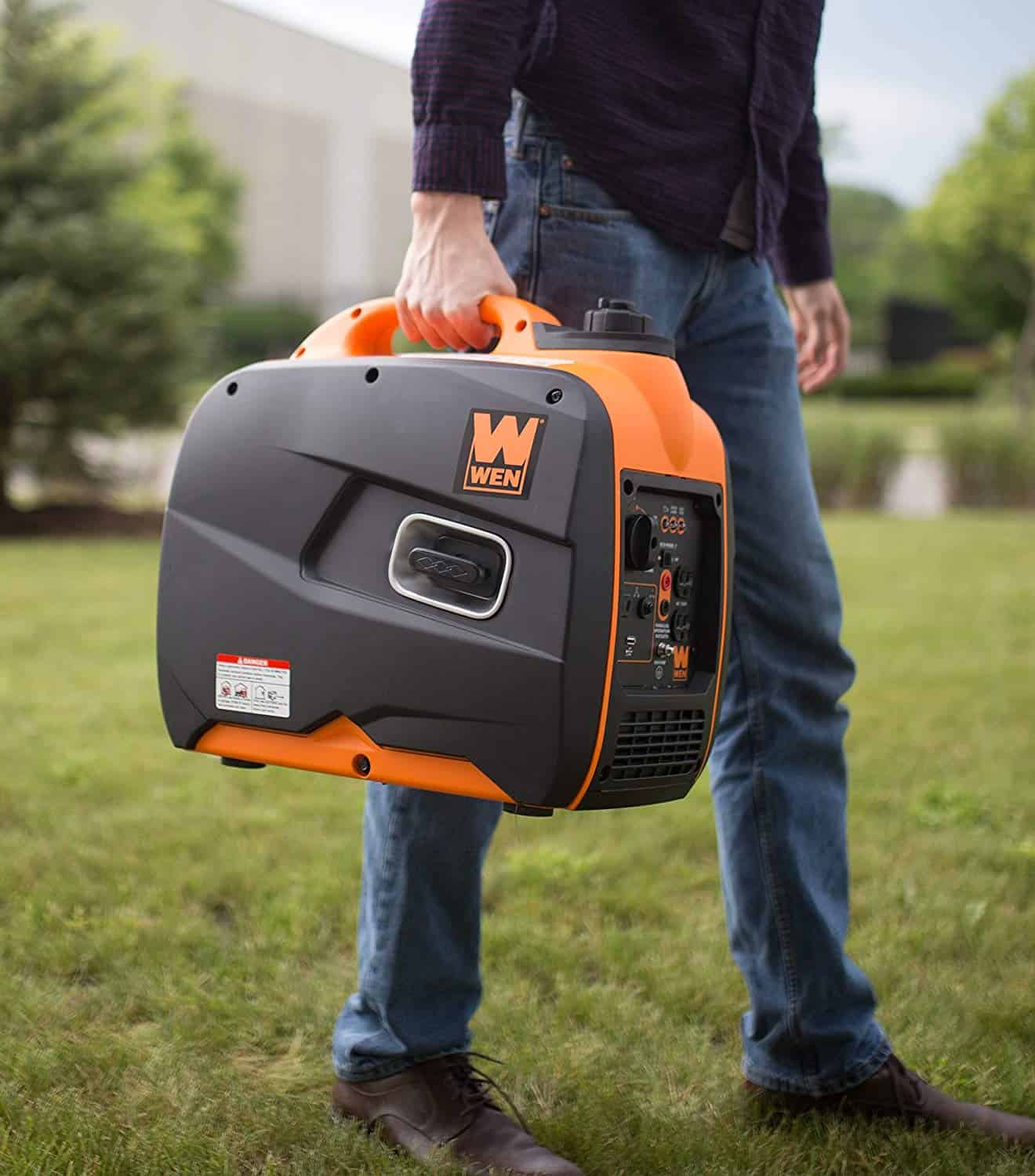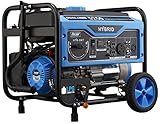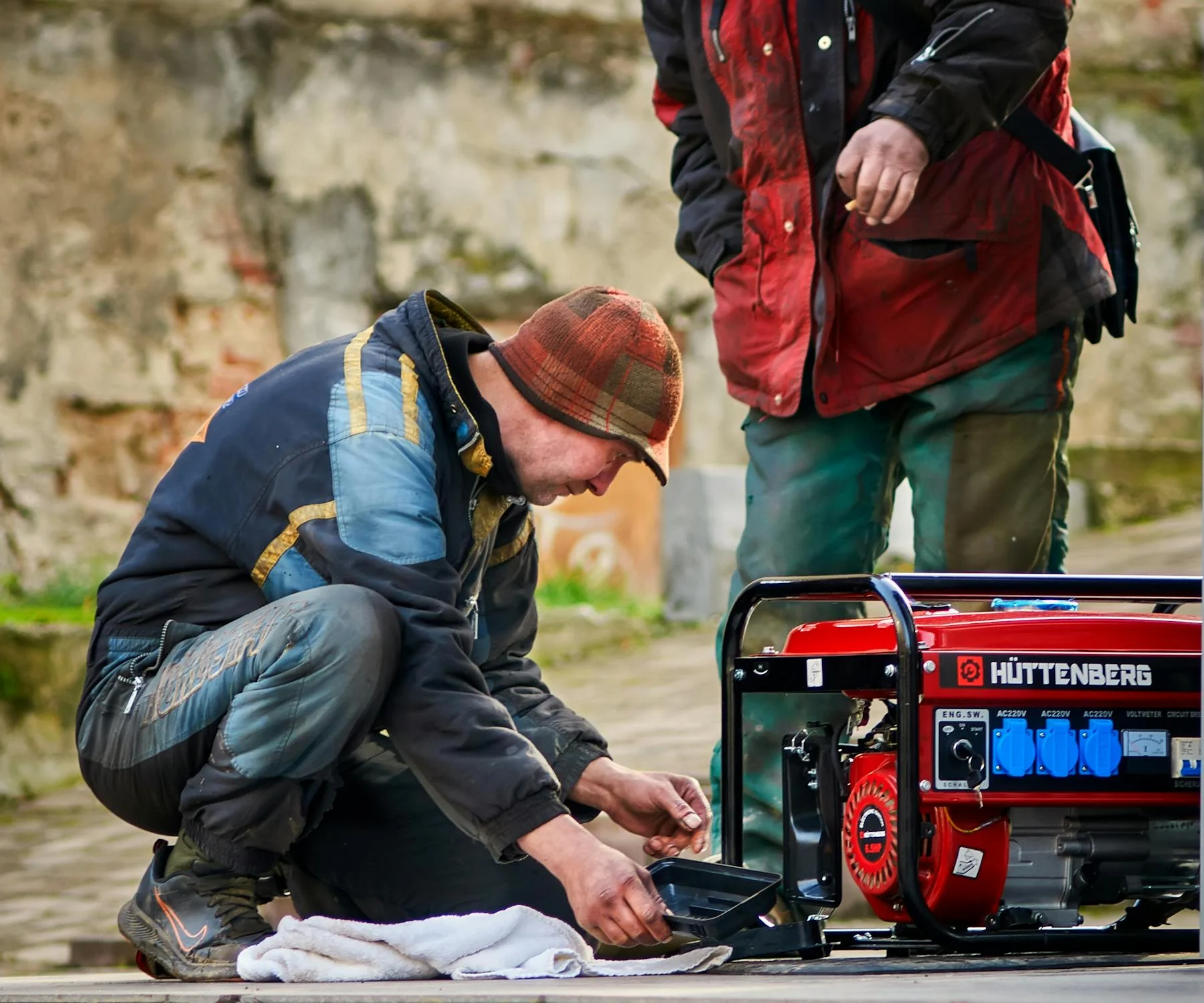You can make your outdoor adventures enjoyable if you have a camping generator and an RV ready.
A portable generator with enough power to connect your appliances is the best for camping and RV use. However, choosing the best RV and camping generator can be challenging due to the abundance of options available on the market.
We have selected some of the top camping and RV generators based on quality, features, mobility, noise level, and, of course, cost to make your job easier.
Let's get specific:
What Does It Mean to be RV Ready?
There is no official definition, but in layman's terms, RV-ready generators are ones that can be connected to an RV without the need for additional equipment.
They have RV outlets that supply 30 amps of power to the RV. In addition, they may include twist-lock generator adapters. Aside from that, RV-ready generators are known for their quiet operation.
Noise level is critical because they must be kept closer to the RV or camping area, and a noisy generator might make it difficult to concentrate or rest.
Here’s a small breakdown to understand noise levels:
Noise Level | Sound |
|---|---|
30 dB | Whispering |
40 dB | Conversation |
50 dB | Laughter |
70 dB | Vacuum Cleaner |
90 dB | City Traffic |
Without much ado, let’s have a look at our top five best camping and RV generators:
1. Westinghouse iGen1200 Super Quiet Portable Inverter Generator
The iGen 1200 is an excellent solution for those who require a smaller generator. It delivers constant and clean energy and can power small outdoor equipment.
Aside from powering an RV, it is also appropriate for tailgating and camping.
Features:
- Two 120V 20 Amp outlets
- Parallel connection supported.
- Less than 3% harmonic distortion.
- Fuel efficient mode to save fuel.
- 20A circuit breaker to prevent damage from overloading.
This little but efficient generator produces 1200 starting watts and 1000 operating watts. This amount of power is sufficient to go camping or hook up to a small RV.
Despite having a small 0.8 gallon fuel tank, it can run for up to 9 hours at 50% load. You can increase the runtime to 12 hours by lowering the load to 25%.
However, 1200 watts of power may not be sufficient to run several critical equipment in your RV. This can be solved by attaching another similar generator via parallel connection. It will double the power to 2400 watts.
Outdoor generators should be lightweight and noiseless. So that people may simply transfer them and enjoy themselves without being bothered by the loudness.
Fortunately, this generator is contained in an acoustic double-insulated body, making it extremely quiet.
Furthermore, it features silent mufflers to reduce noise. Because of these qualities, the generator emits only 52 decibels of noise at 25% load.
Furthermore, you don't have to worry about fuel efficiency because it uses 50% less gasoline than competing generators. This is feasible because of the fuel efficiency mode, which automatically changes the power to meet the needs. Consequently, no fuel is wasted.
Furthermore, it is safe to use sensitive equipment because it uses pure sine wave technology to generate clean energy. You can charge your computers and mobile gadgets without worry.
The 4-stroke 54cc engine is strong and produces no irregularities.
Pros:
Cons:
Conclusion:
Westinghouse iGen1200 Super Quiet Portable Inverter Generator can be a good choice if you only have small appliances to run.
2. Briggs & Stratton PowerSmart Series Portable
This luggage-styled portable generator is perfect for campings and RVs as it packs enough power.
It offers 2400 starting watts and 1800 running watts. This is powerful enough to even run a small AC.
Features:
- Engine speed changes as per the load (Powerstart mode).
- Easier to move with the telescopic handle and wide wheels.
- Automatic idle control.
- Gauge generator load on Statstation LCD.
It has four conventional outlets and can connect up to four different appliances at once. It features a 12v-30 amp lockable outlet with RV converter, a USB port, and a DC outlet. As a result, you may easily connect it to an RV.
With a 1.5-gallon gasoline tank, it can run for around 10 hours at 25% load on a full tank.
This generator features a unique Quiet Power mode that reduces noise. This function allows the unit to create only 58 dB of noise at 25% load. However, at maximum capacity, the noise can become extremely loud.
The equipment features a simple control panel that displays modes and monitors overload, power, and generator condition. Furthermore, it includes a reset button to protect the engine if it becomes overloaded.
This generator is simple to maintain because it displays the majority of the options on the control panel. You can determine how much power and fuel it consumes. Furthermore, it includes a low oil cutoff mechanism to prevent any damage.
While the generator is extremely powerful, you can increase the power by connecting another generator to it.
Pros:
Cons:
Conclusion:
Briggs & Stratton 30545 P3000 PowerSmart Series Portable is perfect for RV use and camping as it will easily power up many appliances. To start heavier appliances, you can use the parallel connection as well.
3. Champion 4000-Watt RV Ready DH Series Open Frame Inverter with Quiet Technology
Another beauty from Champion as it is one of the best companies out there.
Champion 4000 is a combination of power, convenience, and quiet operation. These three traits make it a suitable outdoor camping and RV generator.
It delivers 4000 starting watts and 3500 running watts with which you can power up heavy duty appliances such as ACs, refrigerators, etc.
Features:
This unit has a 2.9 gallon fuel tank and can run for approximately 17 hours when full. In fact, you may increase the runtime even further by using it in "Eco Mode". In this mode, the machine uses less gasoline by altering the settings to match the load. It's a fantastic feature that extends runtime and saves fuel.
It's an LED system that notifies you of overloads, low oil, voltage, and generator status. This is why it's known as a smart generator. Furthermore, these features make it simple to maintain the generator.
It features a 120V 30A RV outlet, two 120V 20A residential outlets, and a dual USB adaptor with a 12V DC outlet. These ports make it RV-ready and suitable for outside use.
Aside from that, it generates just 64 decibels of noise, which can be further lowered by placing it at a distance.
If you believe the unit does not provide adequate power, consider connecting it to another unit utilizing the parallel connection option. It will increase the power output to 7000 watts, making it capable of powering refrigerators, air conditioners, and other larger appliances.
It also includes a low oil shutdown option to prevent the unit from being damaged. Furthermore, the connected appliances are safe because the unit generates clean energy.
Pros:
Cons:
Conclusion:
Champion 4000-Watt RV Ready DH Series Open Frame Inverter with Quiet Technology is a viable option if you wish to power up RV and camping appliances.
4. Pulsar 5250W Dual Fuel Portable Generator with Switch and Go Technology
Pulsar 5250 is not only an RV-ready and camping generator but offers plenty of useful features as well. First of all, it is a dual fuel capable unit that accepts both gasoline and propane. This makes your outdoor expeditions much easier, as you can take along the most suited fuel on your trip.
Features:
With a 4-stroke 244cc engine, this machine can provide 5250 peak watts and 4750 operating watts on gasoline. When utilizing propane, it provides 4250 peak watts and 3850 operating watts.
Dual fuel technology is beneficial since it puts you in a favorable position. You can extend runtime since you have a backup fuel system to fall back on. This makes the generator ideal for extended excursions.
Furthermore, one fuel is more economical and widely available than others, allowing you to easily choose the one you want. Furthermore, the Switch And Go technology allows you to change the kind of fuel while the machine is still working. This ensures that you are never without power for more than a second.
A big 4-gallon tank allows it to run for up to 12 hours at half load. You can increase the runtime by a few hours by lowering the load.
The unit features four different outlets: two AC outlets, one RV port, and one twist lock outlet.
The unit is easy to maintain because it keeps you updated on its performance. There is a mounted fuel gauge for use. There is also an hour meter that tells you how much gasoline is being used and how long it will run for. These features make it easier to maintain and extend the life of the generator.
Starting the machine is easy because it has a simple electric push button start option.
Although everything appears to be in order, there is one minor issue with this device. It creates a sound of 78 decibels, which is quite loud and may cause discomfort at outdoor gatherings.
To overcome this problem, buy an extension cord and place the unit at a good distance so that you do not have to deal with a lot of noise.
Pros:
Cons:
Conclusion:
Pulsar 5,250W Dual Fuel Portable Generator with Switch and Go Technology is powerful and offers the feasibility of choosing the best fuel source as well. You can power up multiple appliances with it and make your outdoor stays worthwhile.
5. Generac 8,000-Watt Gas-Powered Portable Generator
This is a long-lasting, powerful, and lightweight generator that produces 8000 watts. It is sufficient to power a wide range of equipment without any problems.
This generator can also be used to charge sensitive gadgets because it produces clean energy and controls voltage fluctuation. There is no chance of causing damage to your electronics.
Features:
- Large 7.2 gallon fuel tank.
- 10 hours of runtime at 50% load.
- Electric push button start.
- Circuit breaker.
This dependable generator features a 7.2 gallon fuel tank that provides an outstanding runtime of 10 hours at half load. If the loads become too heavy, this unit will trip automatically to prevent it from malfunctioning due to the circuit breaking feature. This is a useful function because it secures other equipment.
With a 389cc OHV engine, this generator will deliver a consistent and clean 5500 operating watts. It will also allow you to connect an RV and run a variety of outdoor equipment.
The pre-equipped hour meter allows you to track maintenance intervals. Furthermore, it tells when the oil is low, allowing you to refill it on time.
The device includes four 5-20R 120V outlets and one L14-30R Twist-Lock 120/240V outlet for connecting to an RV. These five outlets will allow you to use five appliances at the same time.
It is extremely simple to use and start, thanks to the electric start technology. In addition, there are huge wheels underneath for convenient mobility. It also has a collapsible handle for ease transportation and storage.
Pros:
Cons:
Conclusion:
Generac 5939 GP5500 5500 Running Watts/6875 Starting Watts Gas Powered Portable Generator is quite a powerful generator but can be a bit noisy at times. Pick this one if you’re interested in running big appliances.
Best Camping And RV Generator Buying Guide
Since there are so many generators available, you must be strategic and consider specific things to ensure you obtain the best camping and RV generator.
Let's have a look at a few factors to consider while choosing an RV-ready generator:
1. Fuel Type
Firstly, look into the type of fuel that a generator supports. Here are a few common options:
- Gasoline: It is one of the cheapest options out there. Plus, it’s also readily available. Moreover, it is also easy to add or remove gasoline, hence, such generators are typically easier to operate and manage.
- Propane: Propane gas generators are more efficient and produce less emission. Apart from that, propane has a longer shelf life than other fuel sources.
- Diesel: If you are looking to buy a fuel efficient generator for your RV then look for generators that operate on diesel fuel. However, such generators may not be environmentally friendly.
- Solar Powered: Save money on fuel and use solar powered generators to produce electricity. They use solar panels and can be RV-ready as well. They may be more expensive than other generator types but can be good in the long-run as they are eco-friendly and do not always require fuel.
It is best to opt for dual fuel generators so you can choose between two common types. The most common fuel types are propane and gasoline. They are affordable and easily available, so choose wisely.
2. Clean Energy
You would need to charge a variety of appliances, including sensitive appliances like laptops and mobile phones. This is why you’ll need clean energy. Using a powerful generator that has no control over voltage fluctuation can damage these appliances for good.
Generators with pure sine wave technology can handle fluctuations and keep connected appliances safe.
3. Noise
One of the most crucial factors is the amount of noise a generator produces. Your outdoor trips and journeys can be ruined if you pick a generator that is too loud.
Imagine sitting with your friends and having to bear a loud noise that just wouldn’t stop. A noisy generator can even make it difficult to fall asleep.
The most suitable generators for camping and RVs are the ones that produce under 60 dB of noise. Anything above that can be a bit irritating if the unit is placed close to you.
4. Power
This one is a no brainer. You will need to calculate the amount of power you’ll need to operate certain appliances in your RV or camp.
The right way to do this is to read the labels or just Google the amount of power required to run appliances.
For small-scale RVs and camps, a smaller generator that produces under 2000W can be enough. It will easily start a few smaller appliances.
However, if you wish to run heavier appliances such as TV sets, ACs, and microwaves, then you will need to pick a generator with at least 3000 watts.
5. Portability
When you’re choosing an RV-ready generator, weight plays a vital role. You will be carrying the generator from place to place and a heavier generator can cause problems.
Pick a generator that falls under 100 pounds so that you can carry it around easily. Tires and handles can also make a difference.
6. Easy Maintenance
RV and camping generators are kept outdoors most of the time and hence require a lot of care.
Generators with the following features are easier to maintain:
- Voltmeter: A voltmeter attached to the generator shows the number of volts utilized by the unit. It helps you figure out how many volts each appliance uses so that you can control power and only run appliances that you need.
- Hour Meter: This gadget notifies of hourly updates and gives you information on run-time, oil, etc.
- Low Oil Shutdown: Some generators have a built-in feature that ensures the generator stays durable and reliable even when the oil is low.
It automatically shuts down the generator in case of low oil to prevent failure.
How To Keep A Generator In Good Shape When Travelling And Storing?
Generators used for RVs and camping can lose effectiveness if they are not properly maintained. Most RV-ready generators are robust and sturdy because they are designed to withstand harsh weather conditions and other challenges, but maintenance must be done carefully.
Here are some points to bear in mind:
1. Servicing
Servicing is necessary to ensure that all parts and components continue to function. You can service a generator yourself if you have the necessary knowledge; however, it is recommended that you engage a professional.
Instead, take it to a repair shop and let an expert look at it. They will do a comprehensive inspection and repair any gasoline leaks or minor faults to increase efficiency.
Some generators include a guarantee and free service, so take advantage of these offers if possible.
2. Storing The Generator
When not in use, keep the generator dry and cold to avoid fires or overheating.
Aside from that, ensure sure there is enough shade above the unit to prevent rainfall from entering the generator. Additionally, protect it from moisture.
This may not be a problem if you have a weatherproof generator, but use caution.
3. Use Fresh Fuel
Using old fuel can cause starting problems and higher emission. Use new fuel to keep it in good shape and run for a longer period of time.
4. Lubricate
Keep the generator lubricated to ensure there’s no rust and all parts work well. Also known as generator exercising, it involves lubricating the lines, valves, and components so that they work efficiently.
5. Oil Content
If the generator doesn’t have the low oil shutdown feature, then use a dipstick to measure the oil contents and make sure it is filled enough.
6. Clean It Up
Always clean the generator up using a clean cloth, especially after you come back from a trip. Leave no traces of dust, grease, or oil on the unit. Moreover, clean the batteries, too.
You can follow the manual for tips on how to get it done.
How To Properly Connect A Generator To An RV?
To avoid electrical risks and voltage fluctuations, ensure that the generator and RV are properly connected. This is how you do it:
1. Location
RVs typically have an elevated generator tray for added stability. If your RV does not have a tray, you should create one.
It is not recommended to keep the unit on the ground, as this may result in increased noise and performance difficulties. Furthermore, it can provide for the unit's survival.
2. Fill The Tank
Some generators can be connected to the RV’s fuel supply using a propane hose. If yours doesn’t, then manually fill the tank up.
3. Battery Connection
Connect the positive and negative terminals of the battery with the corresponding terminals on the generator. Once done, place the unit and tighten it using a clamp.
4. Fumes
The generator's exhaust system should face outside the RV rather than within. You don't want to find your RV full of smoke.
Carbon monoxide, not just any smoke, has the potential to be fatal. This is also why you should not stay near the generator when it is running.
The Bottom Line:
These are some of the best camping and RV generators on the market. At the end of the day, choose one that meets your demands and includes the characteristics you seek.



















